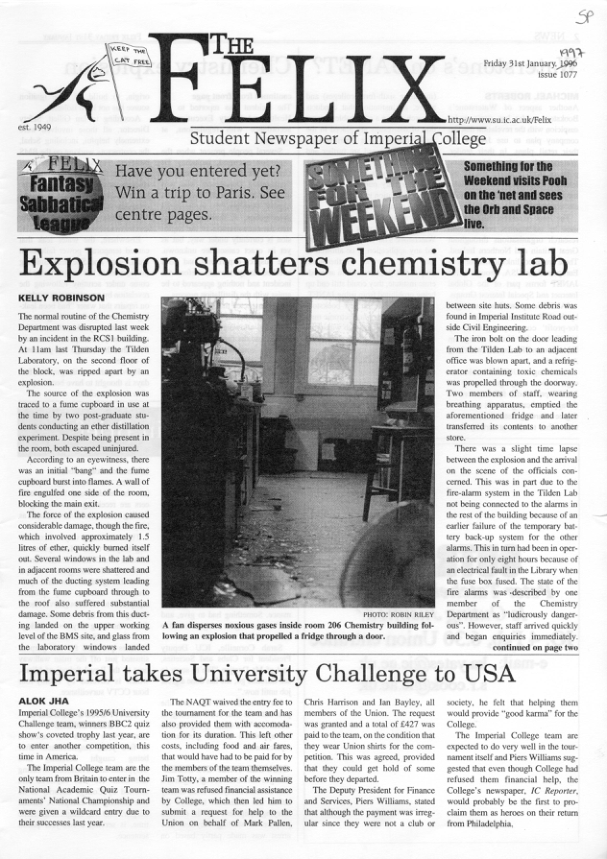Westminster Eye Hamish Common
"Infotainment" is one of those vogue words that, along with "information superhighway" and "cyberspace" have always made me cringe. Whereas the latter are not within the scope of this column, "infotainment" is already hitting our television screens and newspapers, with an array of spin-doctors and PR men to shore it up. In the last few days, our newspapers were filled with stories such as Branson’s balloon trip and ‘Superwoman’ Nicola Horlick’s sacking from Morgan Grenfell. Branson is the master of PR: we were enthralled by pictures of balloons and desert, fed with statistics about the balloon’s dimensions, and shown maps of the intended route. The actual voyage lasted a day or two, around the same time as the other two contenders, indeed Branson’s team had forgotten to bring any loo roll with them. Nicola Horlick’s sacking had received little press coverage until she hired the services of Anthony Cardew, the City’s top spin doctor. She then stormed into her old office where a group of hacks just happened to be waiting and jetted off to the head office at Frankfurt. It certainly had the desired effect: Weekend papers were delighted to show a pretty woman being mistreated by a big nasty organisation, devoting little time to discussing the reasons why the million-pound-a-year fund manager had been suspended.
So what has all this to do with politics? With increasing commercialisation and competition within the media industry, ratings are the ultimate arbiter of success, and the truth will rarely get in the way of a good headline. By targeting the lowest common denominator among its audience, tabloid-style stations and papers can reap rich financial rewards, attracting the envy of those with more substantial budgets for legitimate news-gathering. News departments have moved from loss-makers to profit centres, with the emphasis on images and audiences over prestige, with television news in particular never able to substitute for a good newspaper: whilst it is unbeaten in its ability to present the people and places in the news, its actual volume of news is minute. The number of words spoken in a half hour broadcast would barely fill two-thirds of a broadsheet page. Facts are compressed, arguments clipped to size and explanation reduced, all to fit within television’s restrictive time-frame. Sitting in the public gallery during Prime Minister’s Question Time I would occasionally hear Tony Blair suddenly rant away on a completely different issue from whatever was being discussed at the time. This confused me at first, until I saw him on the 6 o’clock news that evening, with 5 seconds of him ranting away. He was shown on every channel and every news broadcast that night, each with the identical 5 second clip. He had never really been addressing the House that afternoon, and the publicity his comments received did him no harm at all.
Soundbite journalism is unable to present the electorate with any realistic view of events. The public become used to flashy headlines and, for the most part, have no wish to look too far beyond them. When, last Wednesday the Guardian correctly reported that Labour intended to change the BBC’s constitution to strip governors’ powers, it was headlined as "BBC faces upheaval in Labour plan". The spin masters threw tantrums because they didn’t like the word "upheaval" in a headline (it would not give the appropriate Labour image) and set about rubbishing the story. It is disturbing to see such an palava over one word in a broadsheet headline, but this is the image-over-substance reality that is unfortunately seeping across the Atlantic.
I do hope that television networks and newspaper magnates make their big money from entertainment, keeping the lure of simple profit away from the newsroom, as any shallowness here will tempt people to form their opinions purely upon the headlines and front stories, upon the politician’s personalities or upon polished images. They will be fair game for the spin doctors, with their opinions on the significant issues of the day decided for them behind closed doors, in advance, with a handshake.





